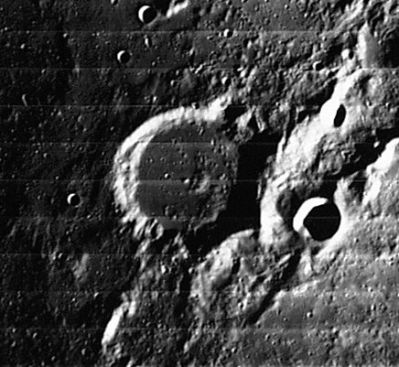Epigenes
Contents
Epigenes
|
Lat: 67.5°N, Long: 4.6°W, Diam: 55 km, Depth: 3.21 km, [/R%C3%BCkl%204 Rükl: 4], [/stratigraphy Nectarian] |
Table of Contents
[#Epigenes Epigenes]
[#Epigenes-Images Images]
[#Epigenes-Maps Maps]
[#Epigenes-Description Description]
[#Epigenes-Description: Elger Description: Elger]
[#Epigenes-Description: Wikipedia Description: Wikipedia]
[#Epigenes-Additional Information Additional Information]
[#Epigenes-Nomenclature Nomenclature]
[#Epigenes-LPOD Articles LPOD Articles]
[#Epigenes-Bibliography Bibliography]

LOIV-116-H2 Epigenes is at center. The 18 km round crater to its right is Epigenes A, a prominent bright [/ray%20craters rayed] feature at [/Full%20Moon Full Moon].
Images
LPOD Photo Gallery Lunar Orbiter Images
Maps
([/LAC%20zone LAC zone] 3C4) USGS Digital Atlas PDF
Description
Description: Elger
([/IAU%20Directions IAU Directions]) EPIGENES.--A remarkable ring-plain, about 26 miles in diameter, abutting on a mountain ridge running parallel to the W. flank of [/W.%20Bond W.C. Bond]. It is a notable object under a low morning sun. There are several elevations on the floor.
Description: Wikipedia
Additional Information
- Depth data from [/Kurt%20Fisher%20crater%20depths Kurt Fisher database]
- Westfall, 2000: 3.21 km
- Viscardy, 1985: 2 km
- Cherrington, 1969: 0.79 km
- Central peak height
- [/Sekiguchi%2C%201972 Sekiguchi, 1972]: 0.45 km - fatastronomer fatastronomer
- Epigenes A, the bowl-shaped high-[/albedo albedo] crater immediately east of Epigenes itself, is a good guide to know the northern location of the 0° meridian of longitude as seen during [/Full%20Moon Full Moon]. Depending on [/librations librations], the Moon's [/North%20Pole North Pole] will be a little to the right or left of the shortest line connecting Epigenes A to the [/limb limb]. - DannyCaes DannyCaes Sep 19, 2010
Nomenclature
- Named for Epigenes of Byzantium (unknown-circa 200 BC), a Greek astrologer. He seems to have been strong supporter of astrology, which, though derided by many Greek intellectuals, had been accepted and adopted by many Greeks from the seventh century BC through commercial contact with the Chaldeans of Babylonia.
LPOD Articles
Bibliography
This page has been edited 1 times. The last modification was made by - tychocrater tychocrater on Jun 13, 2009 3:24 pm - afx3u2